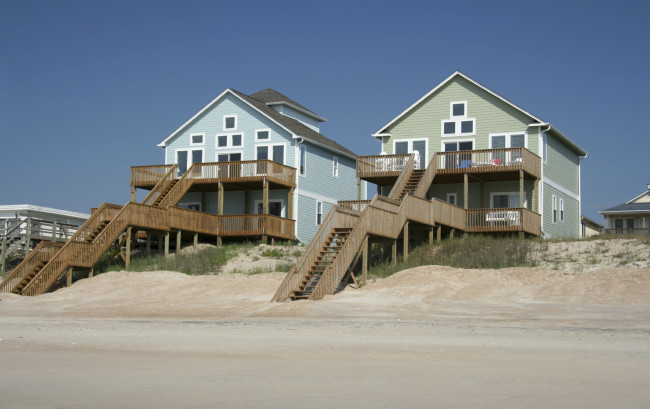5 things to know before you buy an investment rental property out of state

If you want to start investing in real estate but are on a budget, it can make perfect sense to take your search outside the city. After all, whether you're looking for vacation property to rent out part of the time, or a multi-family to kickstart your career as a landlord, there's no question that you can get a lot more proverbial bang for your buck outside of the ultra-pricey five boroughs. (Indeed, snapping up homes in cheaper states has become an increasingly popular move for coastal investors across the country.)
Wading into an unfamiliar market—and a different state's legal technicalities—can be as jarring for a New York buyer as our city's peculiar market can be to newcomers. Below, five things to consider before you cross state lines in search of your next real estate nest egg.
[This article previously ran in December, 2016. We are presenting it again in case you missed it.]
For your closing team, think local—and rely on referrals
As always in the real estate search, word-of-mouth can be your best friend. This is especially true outside of the city, where you have fewer search engines to choose from (for instance, there's no StreetEasy) and may have to contend with misinformation. "The top option out of the city is Zillow, but you'll definitely want to double-check your facts," says Halstead agent Jill Sloane. "Also, people can pay to be the 'broker of choice' for an area, so someone might pop up as the recommended on a listing because they've paid to be there." Instead, Sloane recommends finding a buyer's broker through a referral, or failing that, "calling two or three brokers to see who you click with."
If you have a broker you work with here in the city, ask them if they have contacts in the area you're looking in—even if they don't personally, if they work for a larger brokerage, their corporate branch will very likely have contacts (or brokers of their own) in the area.
Similarly, when it comes to your mortgage lender and attorney on the deal, it's generally best to find someone who works in the area and is familiar with local ins and outs. (And once you find a local broker, they'll almost certainly have solid recommendations on hand in the area.)
"It depends on your preference, but I recommend someone more local [as your lender]," says Ace Watanasuparp of Citizens Bank. "When you use a local banker, they'll know the local market and be more familiar with the collateral."
The "collateral" is mortgage lingo for getting the building approved, which can be tricky if you're working with a larger bank that's not aware of the particular local market—for instance, the way some lenders are edgy about NYC co-ops. (Watanasuparp says Miami, for example, where there are a lot of condos that are primarily investor-occupied and might not be approved for loans by banks outside of Florida.)
A locally based attorney will also serve you well both during the deal and long after it's done. "Laws are different in different jurisdictions, and some have especially strong tenants' rights legislation," says Andrea Saturno-Sanjana of Citi Habitats. "Be aware of the regulations, for instance, if you decide to sell while the tenant is still in place. I think most times when people run into trouble, it's when they don't know the local rules or aren't aware of the timetable for communicating changes to the tenant."
An attorney who's wise to a city or town's laws will also be an invaluable resource if you run into problems with tenants down the road. "You have to develop a relationship with a local attorney to help close the transaction, but also, to have someone on hand who knows the local procedures for eviction," explains attorney Jerry Feeney. "That's a very important process that people forget. You want to have a lease in place that properly documents everything and defines the tenants' responsibilies, as well, and also to be able to move quickly if a tenant stops paying rent."
Bottom line: In other states, "things are done very differently than what you might be used to in New York," says Saturno-Sanjana. You'll want a local guide to lead the way.
Financing details may differ
Here, the issue is more that you're buying a second home as an investment, rather than that you're buying outside of New York state.
"When you're buying a second home for your own use, the banks will allow you to take advantage of primary residence rates," says Watanasuparp. "But if you're buying and planning to rent it out, they consider it an investment property, making the rates a little higher—usually be a quarter to three-quarters of a percent. You also might have to put a little bit larger of a down payment down, maybe 25 percent to 30 percent depending on the bank."
And in the event you're tempted to take a shortcut, "don't lie to the bank and say it's a second home, then rent it out, anyway," warns Feeney. "That's fraud."
Also to keep in mind for first-time investors: If you can't afford the property without factoring in your projected rental income (in other words, if you couldn't afford to buy it for your own personal use), banks will require that you have a prior track record as a successful landlord.
"You would have to have two years of rental history if you can't get financing without the rental income," says Watanasuparp. "They want to make sure you understand the responsibilities involved." Most banks will also only factor in 75 percent of your projected income, in order to play it safe. "So if the rent is $1,000 per month, the banks will only use $750." This is a good rule of thumb for you to use in your own financial calculations, as well—more on that below.
Be conservative when projecting rental income
Just as the banks do when figuring out financing, when you're looking at your projected rental income, be sure to leave in some wiggle room for unforeseen expenses and months the place might sit empty.
"When people are buying investment properties, they often forget when doing their cost/income analysis to put in a vacancy rate," says Feeney. "Something like 5 percent or 6 percent. So every year, the rent you're projecting, reduce that number by around 6 percent to account for every once in a while when you're going to have a month where it's empty. Outside of New York, it's even less likely to get back-to-back tenants."
Feeney also warns to be skeptical of brokers who promise that a property is renting for under market rate, and that you'll be able to hike up the prices.
"Don't just assume that because a broker says you can raise the rent, that you can do it immediately," he says. "Maybe there's a long-running tenant who won't leave easily or is worth keeping, maybe the current landlord found they couldn't get a higher price. Buyers immediately do their projections based on the higher number, without understanding the reason the rent might be lower."
You'll need extra insurance
Any time you're making the transition from "owner" to "landlord," you'll need extra coverage. This is also further incentive not to lie to the bank about your intentions for the property in hopes of a better mortgage, notes Feeney. "You have to have landlord's insurance," he explains. "If a tenant slips and falls, you won't be indemnified if you lied about the use of the property."
Thankfully, this extra coverage shouldn't be a huge added expense on top of your regular policy. "You can usually extend your own residential insurance to provide 'landlord liability' as long as you're not using the property as a short-term rental like Airbnb," says Jeff Schneider of Gotham Brokerage (FYI, a Brick sponsor). Generally, this should run you about an extra $100 per year.
Maintenance and home improvement costs add up
Anytime you're buying a home outside the city—particularly if it's a house and not an apartment—there are going to be extra issues to take into consideration.
"One thing that's really important if you're buying a property is to make sure you're given a survey to understand what you're actually buying," says Sloane. "You'll want to get a home inspection, which you wouldn't need to do for a loft or a condo." You don't want to get caught off-guard by, say, a rickety roof, foundation issues, or a plumbing system that isn't up to snuff.
"Do all of the engineering inspections and other due diligence you would normally do when buying a house [versus an apartment]," Feeney concurs. And then in your cost projections, be sure to factor in a certain amount each year for maintenance costs. "Three percent to 5 percent per year is a reasonable percentage," says Feeney. "But it depends on how old your infrastructure is—if you have an older roof, or facade, or boiler, you have to increase the cost in your projections."
And similar to having an attorney on hand for a rainy day, Feeney recommends lining up your maintenance staff before anything goes wrong. "You need to know who the tenant is going to call at night when there's no hot water," he says. "You have to have some kind of arrangement with a handyman who will come and take care of it. Otherwise you'll bankrupt yourself calling in a plumber every time." For a multi-unit building, you also need to determine ahead of time who handles things like taking out the garbage. (Here, Feeney notes, you could potentially bargain with a tenant, offering cheaper rent in exchange for a few tasks around the building.)
Since you won't be able to simply hop on the subway to swoop in and solve problems yourself, it's especially important to have a plan in place for last-minute requests or emergencies. But with appropriate preparation in advance, you'll be able to kick back in your apartment in the city, and let the checks start rolling in.
You Might Also Like


























